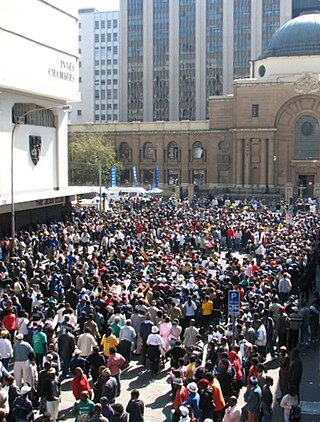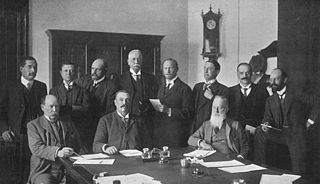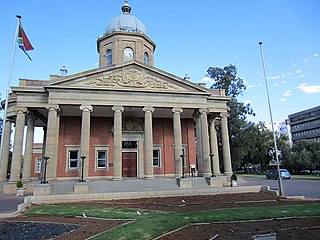
Bloemfontein, also known as Bloem, is the capital and the largest city of the Free State province in South Africa. It is often, and has been traditionally, referred to as the country's "judicial capital", alongside the legislative capital Cape Town and administrative capital Pretoria, although the highest court in South Africa, the Constitutional Court, has been in Johannesburg since 1994.

The Union of South Africa was the historical predecessor to the present-day Republic of South Africa. It came into existence on 31 May 1910 with the unification of the Cape, Natal, Transvaal, and Orange River colonies. It included the territories that were formerly part of the South African Republic and the Orange Free State.

South Africa is divided into nine provinces. On the eve of the 1994 general election, South Africa's former homelands, known as Bantustans, were reintegrated into the country, and the four provinces were increased to nine. The borders of Natal and the Orange Free State were retained, while the Cape Province and Transvaal were divided into three provinces each, plus North West Province which straddles the border of and contains territory from both these two former provinces. The twelfth, thirteenth and sixteenth amendments to the Constitution of South Africa changed the borders of seven of the provinces.

The Orange Free State was an independent Boer sovereign republic under British suzerainty in Southern Africa during the second half of the 19th century, which ceased to exist after it was defeated and surrendered to the British Empire at the end of the Second Boer War in 1902. It is one of the three historical precursors to the present-day Free State province.

The Orange River Colony was the British colony created after Britain first occupied (1900) and then annexed (1902) the independent Orange Free State in the Second Boer War. The colony ceased to exist in 1910, when it was absorbed into the Union of South Africa as the Orange Free State Province.

The High Court of South Africa is a superior court of law in South Africa. It is divided into nine provincial divisions, some of which sit in more than one location. Each High Court division has general jurisdiction over a defined geographical area in which it is situated. The decisions of a division are binding on magistrates' courts within its area of jurisdiction. The High Court has jurisdiction over all matters, but it usually only hears civil matters involving more than 400,000 rand, and serious criminal cases. It also hears any appeals or reviews from magistrates' courts and other lower courts.

Francis William Reitz, Jr. was a South African lawyer, politician, statesman, publicist, and poet who was a member of parliament of the Cape Colony, Chief Justice and fifth State President of the Orange Free State, State Secretary of the South African Republic at the time of the Second Boer War, and the first president of the Senate of the Union of South Africa.

The South Africa Act 1909 was an act of the Parliament of the United Kingdom that created the Union of South Africa out of the former Cape, Natal, Orange River, and Transvaal colonies. The Act also allowed for potential admission of Rhodesia into the Union, a proposal rejected by Rhodesian colonists in a 1922 referendum. The draft proposal was supported by the four colonial parliaments, but was opposed by Cape Colony premier W. P. Schreiner, who raised concerns that it would strip rights from non-white South Africans.
The Supreme Court of South Africa was a superior court of law in South Africa from 1910 to 1997. It was made up of various provincial and local divisions with jurisdiction over specific geographical areas, and an Appellate Division which was the highest appellate court in the country.

The courts of South Africa are the civil and criminal courts responsible for the administration of justice in South Africa. They apply the law of South Africa and are established under the Constitution of South Africa or under Acts of the Parliament of South Africa.

The Western Cape Division of the High Court of South Africa is a superior court of law with general jurisdiction over the Western Cape province of South Africa. The division, which sits at Cape Town, consists of 31 judges led by Acting Judge President Patricia Goliath, former Acting Constitutional Court Justice.
The Northern Cape Division of the High Court of South Africa is a superior court of law with general jurisdiction over the Northern Cape province of South Africa. The division sits at Kimberley.

The KwaZulu-Natal Division of the High Court of South Africa is a superior court of law with general jurisdiction over the KwaZulu-Natal province of South Africa. The main seat of the division is at Pietermaritzburg, while a subordinate local seat at Durban has concurrent jurisdiction over the coastal region of the province. As of January 2024 the Judge President of the division is Thoba Poyo-Dlwati.
The North West Division of the High Court of South Africa is a superior court of law with general jurisdiction over the western part of North West province of South Africa. The division sits at Mahikeng.

The Gauteng Division of the High Court of South Africa is a superior court of law which has general jurisdiction over the South African province of Gauteng and the eastern part of North West province. The main seat of the division is at Pretoria, while a local seat at Johannesburg has concurrent jurisdiction over the southern parts of Gauteng. Dunstan Mlambo has been the Judge President of the division since 1 November 2012.

Jacob Abraham Jeremy de Villiers was a judge of the Appellate Division from 1920 to 1932 and Chief Justice of South Africa from 1929 to 1932.

The National Convention, also known as the Convention on the Closer Union of South Africa or the Closer Union Convention, was a constitutional convention held between 1908 and 1909 in Durban, Cape Town and Bloemfontein. The convention led to the adoption of the South Africa Act by the British Parliament and thus to the creation of the Union of South Africa. The four colonies of the area that would become South Africa - the Cape Colony, Natal Colony, the Orange River Colony and the Transvaal Colony - were represented at the convention, along with a delegation from Rhodesia. There were 33 delegates in total, with the Cape being represented by 12, the Transvaal eight, the Orange River five, Natal five, and Rhodesia three. The convention was held behind closed doors, in the fear that a public affair would lead delegates to refuse compromising on contentious areas of disagreement. All the delegates were white men, a third of them were farmers, ten were lawyers, and some were academics. Two-thirds had fought on either side of the Second Boer War.

The Fourth Raadsaal is a historic building in Bloemfontein, South Africa, which serves as the meeting place of the Free State Provincial Legislature, the legislature of the Free State. It is located opposite the Supreme Court of Appeal in President Brand Street.
Leonora van den Heever is a former judge of the High Court of South Africa. She is South Africa's first female judge and the first woman to be appointed as a judge of the Supreme Court of Appeal of South Africa.
Josephus Johannes Francois "Joos" Hefer is a South African judge and former Acting President of the Supreme Court of Appeal of South Africa.
















